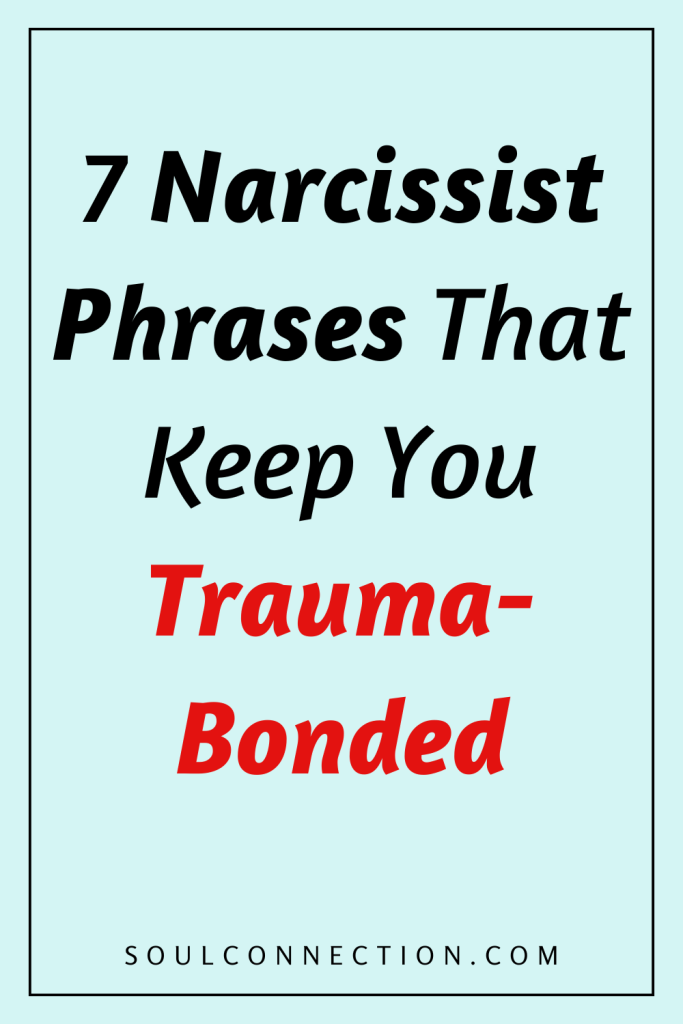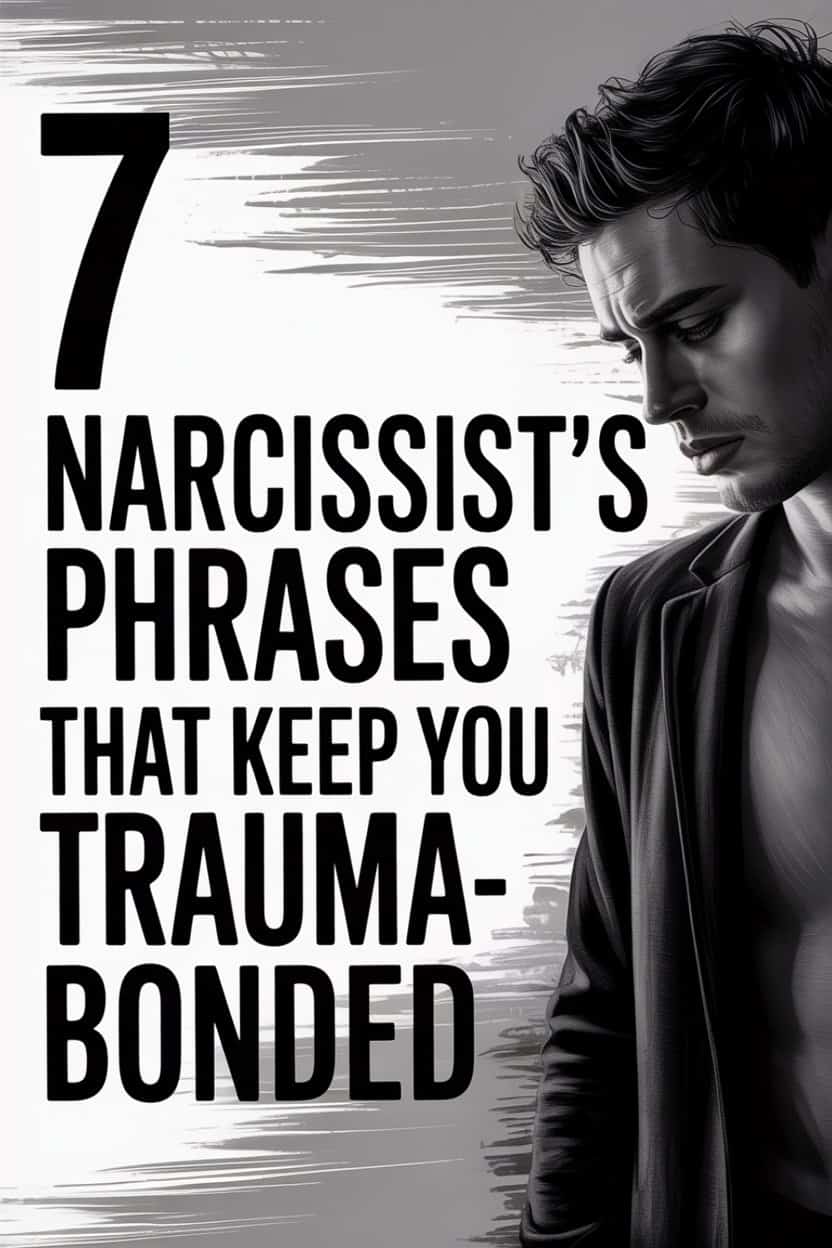Every relationship has its quirks—someone leaves socks on the floor, the other forgets bin night, and occasionally, one partner gaslights the other into an emotional pretzel. You know, the classics.
But there’s a special kind of relationship drama when narcissism enters the chat.
Suddenly, you’re starring in a psychological thriller you never auditioned for, directed by someone who only knows how to play the hero—or, more accurately, the only character who matters.
Narcissists don’t just argue; they build entire word-sculptures designed to keep you hooked, confused, and weirdly loyal even when your gut is screaming, “RUN.”
Here are the seven most toxic phrases you’ll hear from a narcissist, and how they keep that trauma bond tied tighter than your nan’s apron strings.
1. “You’re too sensitive”
Classic move. The narcissist does something hurtful—a cutting remark, a sneaky betrayal, a ‘joke’ that lands like a brick. You call them out, hoping for a glimmer of accountability, and what pops out? “You’re too sensitive.”
Translation: Your feelings are the problem, not my behaviour. Suddenly you’re questioning your own emotional settings like a malfunctioning robot. Am I overreacting? Should I toughen up?
Spoiler alert: your emotional reaction is fine. The narcissist’s behaviour is the real issue.
This phrase trains you to ignore your own boundaries and accept worse treatment over time. It’s like emotional de-conditioning—each time you flinch at bad behaviour, you get told it’s your fault for flinching.
What helps: Rehearse this mantra—“My feelings are valid, even if someone else finds them inconvenient.” Every time you hear this phrase, mentally swap it for, “I don’t want to change, so please stop making this awkward.”
2. “If you really loved me, you would…”
Ah, the emotional blackmail power play. It comes in many flavors: “If you really loved me, you’d trust me with your bank account password.” Or, “If you loved me, you’d skip your family’s Christmas for our Netflix marathon.”
The aim? To make love conditional. Your efforts, boundaries, and even your time with friends or family are suddenly up for negotiation.
You’re cast as the villain for wanting a shred of independence, and the only way to prove your affection is by giving up more of yourself.
It’s an ever-moving goalpost, because no matter how much you give, it’s never enough. (And don’t worry—they’ll let you know.)
What helps: Recognise that healthy love doesn’t require a recurring sacrifice. If someone’s affection starts sounding like a loyalty test, you’re not in a partnership—you’re in an audition.
3. “You’re remembering it wrong”
Gaslighting’s greatest hit. You bring up something upsetting from last week—a shouting match, a broken promise, that time they humiliated you in front of your mates—and suddenly, you’re told it never happened.
Or, if it did, it happened completely differently.
You develop a fun new hobby: doubting your own sanity.
This phrase is engineered to make you question your memory, perspective, and, eventually, your grip on reality. If they can rewrite the past, they get to rewrite your present—and your future.
What helps: Keep a journal. No, seriously—be your own court stenographer.
Writing things down helps solidify your reality and gives you something to refer back to when the revisionist history tour comes to town.
4. “Everyone else agrees with me”
You’re not just “too sensitive” in their eyes—apparently, the entire population of Earth is on their side. Suddenly, your friends, family, or co-workers are quoted as witnesses to your unreasonable-ness.
“We all think you’re overreacting.”
There’s rarely any evidence of these mysterious, unanimous panels. But the implication is clear: you’re not only wrong, you’re isolated. Doubt creeps in.
Are you really the problem? Why is everyone else so calm?
This tactic isolates you and undercuts your confidence. Community is replaced with suspicion, and you’re less likely to reach out for help.
What helps: Check in with your actual friends or loved ones—outside the narcissist’s earshot. Narcissists love to “speak for everyone,” but those “everyone”s are usually fictional.
5. “Look what you made me do”
Taylor Swift may have turned this into a catchy chorus, but narcissists have been singing it for years. When confronted with their own bad behaviour, they flip the script: you drove them to it.
“I wouldn’t have yelled if you didn’t nag me.”
“I only lied because you’re so paranoid.”
Suddenly, you’re the architect of their actions, responsible for their every lie, outburst, or sulk. It’s a guilt trip and blame shift rolled into one neat package.
What helps: Remind yourself that everyone is responsible for their own behaviour—even people who think they’re above the law (or basic decency).
Someone’s actions are not your fault just because you were in the room when they happened.
6. “I guess I’m just a terrible person, then”
The martyr card. You call out their behaviour and, instead of owning it, they retreat into a self-pitying puddle. Now you’re comforting them, reassuring them that they’re not a monster.
“I guess nothing I do is ever good enough for you.”
“Well, I see I can’t do anything right.”
This phrase is engineered to make you feel guilty for having standards. Suddenly, the victim is them, and you’re bending over backwards to make them feel better about what they just did to you.
What helps: Resist the urge to rescue. It’s fine to feel empathy, but don’t let it morph into forgetting why you were upset in the first place.
It’s not your job to convince someone they’re not awful, especially when they’re using self-pity to dodge accountability.
7. “No one else will ever love you like I do”
Break out the violins—here comes the pièce de résistance. When all else fails, nothing keeps a trauma bond humming like this bit of emotional sabotage.
The message: You’re so uniquely flawed, only this person could possibly tolerate you. It’s the romantic equivalent of “Don’t bother leaving, the world’s crueler than I am.”
Isolation, fear, and low self-esteem converge in this phrase. If you believe it, you’ll put up with almost anything, just to avoid being “alone” (spoiler: you’re already emotionally alone).
What helps: Picture your best mate or your sibling hearing this line—would you want them to stay, or would you be warming up the car to rescue them?
The right partner doesn’t keep you with threats of loneliness; they make staying feel like a choice, not a sentence.
Cutting the Strings
Breaking trauma bonds is no picnic. There’s a reason these phrases work so well: they tap straight into our deepest insecurities, our need for connection, and our hope that if we just try harder, things will go back to “how they used to be.”
(Spoiler: That version of the relationship was probably just as manufactured.)
Noticing these phrases is step one. Next time you hear them, notice how your body reacts. Is your stomach in knots? Are you shrinking inside? That’s your cue that something’s off.
Boundaries aren’t just for garden fences—they protect your emotional home, too. When you spot these manipulation tactics, it’s time to take your power back, even if it starts with a single “No” or a night in the spare room.
Real love doesn’t require you to shrink, doubt yourself, or accept the unacceptable. Anyone who says otherwise probably has a few sock puppets on their “everyone agrees with me” panel.
And if all else fails? Ring your best mate, tell them everything, and let them remind you that there’s nothing wrong with your memory, your feelings, or your worth.
Tea and biscuits optional, but highly recommended.


